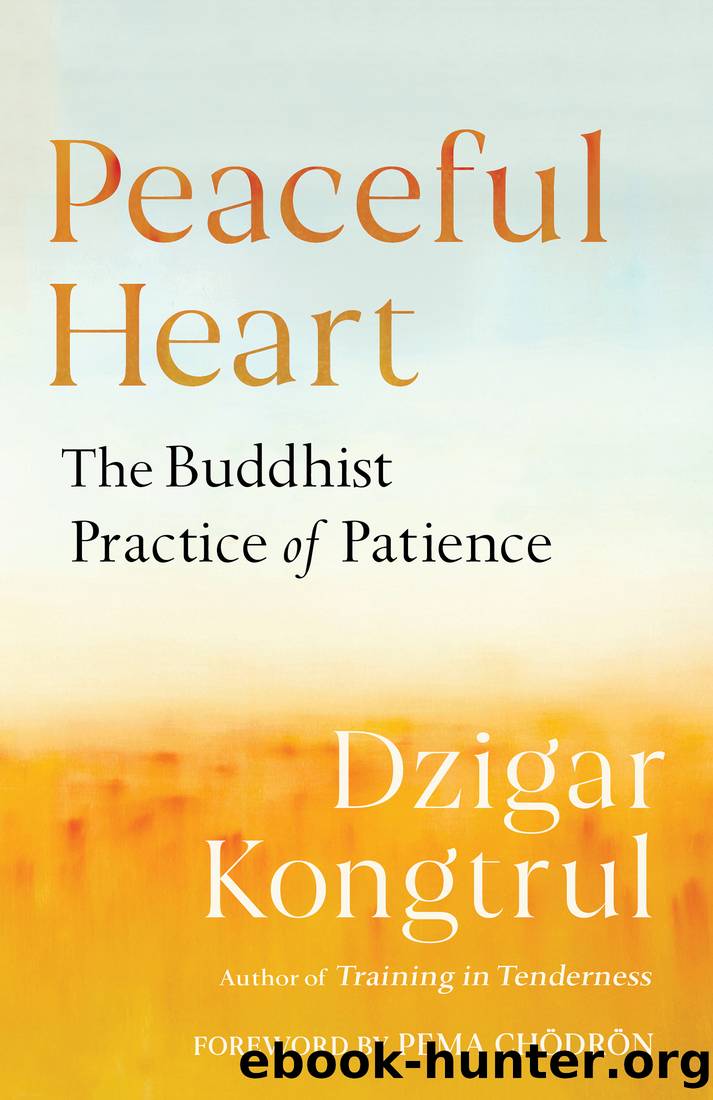Peaceful Heart by Dzigar Kongtrul

Author:Dzigar Kongtrul [Kongtrul, Dzigar]
Language: eng
Format: epub
Publisher: Shambhala
Published: 2020-12-22T00:00:00+00:00
58
And when they wake, the happiness of both
Is finished, never to return.
Likewise, when the hour of death comes round,
Our lives are over, whether brief or long.
59
Though we be rich in worldly goods,
Delighting in our wealth for many years,
Despoiled and stripped as though by thieves,
We must go naked and with empty hands.
Whether life is long or short, when itâs over, itâs over. At that point, it wonât matter how many possessions and pleasurable experiences we have or havenât had. It is just like having a dream. Whether the dream is long or short, pleasant or painful, it vanishes completely as soon as we wake up. We canât take any of it with us.
At first glance, thinking along these lines may seem sad and depressing, but when done with a positive attitude, it makes our minds lighter and more cheerful. See if this isnât so yourself. The most positive attitude we can have is bodhicitta, the mind-set of awakening, which carries with it the magnificent vision of attaining enlightenment over lifetimes for the benefit of others. From this point of view, what is really sad and depressing is how deeply attached we are to the illusory phenomena of samsara. Because of our attachments, we do so many harmful things and have to face so many painful consequences. In most cases, weâre even aware that our attachments donât serve us, yet our bondage to them is too overpowering.
The only way to free ourselves from this bondage is by letting go, but letting go is not as simple as it sounds. It requires critical intelligence and self-reflection to identify the confusion at the root of our bondage. That is why contemplations such as those in these stanzas are so important. They are a good example of one of Shantidevaâs specialtiesâhaving a straight talk with himself. If we really want to be free of our bondage to attachment, aggression, and other painful states, we would be wise to follow Shantidevaâs lead.
We can talk with ourselves in this way: My life will come to an end. When Iâm on my deathbed, which will happen sooner than I think, everything I have gathered and accomplished will be in the past. What will matter then is how well I can face my death and my fear of the unknown next world. For this the most important factor is the state of my heart, specifically my tsewa and bodhicitta. So why should I be driven by all these attachments to temporary things? Why go through so much anxiety and stress, and why run myself into the ground while committing so many actions that harm myself and others along the way?
This kind of straight talk wonât immediately free us from our excessive attachments, but it should weaken the blind intensity of our drives. We tend to go around with minds full of anxiety about meeting our needs and fulfilling our desires. Thinking about impermanence and death loosens the grip these things have on us. It gives us space from our anxiety and perspective on our lives.
Download
This site does not store any files on its server. We only index and link to content provided by other sites. Please contact the content providers to delete copyright contents if any and email us, we'll remove relevant links or contents immediately.
The Way of Zen by Alan W. Watts(6614)
Ego Is the Enemy by Ryan Holiday(5448)
The Art of Happiness by The Dalai Lama(4130)
The Book of Joy by Dalai Lama(3986)
Why Buddhism is True by Robert Wright(3453)
Spark Joy by Marie Kondo(3302)
Shift into Freedom by Loch Kelly(3199)
Happiness by Matthieu Ricard(3048)
A Monk's Guide to a Clean House and Mind by Shoukei Matsumoto(2915)
The Lost Art of Good Conversation by Sakyong Mipham(2654)
The Meaning of the Library by unknow(2571)
The Unfettered Mind: Writings from a Zen Master to a Master Swordsman by Takuan Soho(2311)
The Third Eye by T. Lobsang Rampa(2267)
Anthology by T J(2213)
Red Shambhala by Andrei Znamenski(2199)
The Diamond Cutter by Geshe Michael Roach(2061)
Thoughts Without A Thinker: Psychotherapy from a Buddhist Perspective by Epstein Mark(2025)
Twilight of Idols and Anti-Christ by Friedrich Nietzsche(1894)
Advice Not Given by Mark Epstein(1880)
